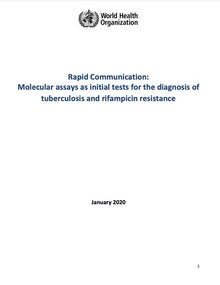Background
Tuberculosis (TB) remains a threat to global public health and is the top infectious cause of death globally. In 2018, an estimated 10 million people developed TB and 1.5 million died from the disease.1 At least 1 million children become ill with TB every year. In 2018, an estimated 205 000 children died of TB. About 500,000 new cases of multidrug 2 and rifampicin-resistant tuberculosis (MDR/RR-TB) are estimated to emerge annually but only one in three cases were reported by countries to have been diagnosed and treated in 2018.
Ending the global TB epidemic will only be achievable if there is intensive action by all countries that have endorsed the End TB Strategy and its ambitious targets.3 It requires a paradigm shift from the conventional approaches to disease control used previously. Early and accurate diagnosis of all forms of TB and rapid detection of drug resistance is fundamental to this shift.
Since the approval by WHO of Xpert® MTB/RIF (Cepheid, Sunnyvale, USA, hereafter referred to as ‘Xpert MTB/RIF’) in 2010, significant additional evidence has been generated on its use as initial test for the diagnosis of TB and rifampicin-resistant TB. In recent months new data on the use of Xpert® MTB/RIF Ultra (Cepheid, Sunnyvale, USA, hereafter referred to as ‘Xpert Ultra’) and on the latest version Truenat® MTB and MTB Plus system (Molbio Diagnostics, Goa, India, hereafter referred to as ‘Truenat’) have also become available.
WHO commissioned a systematic review of all the available data in 2019. The results were assessed during a meeting of an independent WHO-convened Guideline Development Group (GDG) on 3-6 December 2019. Detailed recommendations will be published as part of updated WHO Consolidated Guidelines on TB diagnosis in 2020.
This Rapid Communication aims to inform national TB programmes and other stakeholders about the key implications of the latest evidence on the use of specific molecular assays as initial diagnostic tests of pulmonary and extrapulmonary TB and RR-TB, in adults and children.
The updated 2020 WHO Consolidated Guidelines will also incorporate recent WHO recommendations on other rapid tests including line probe assays, urine lipoarabinomannan lateral flow assays and molecular loop-mediated isothermal amplification assays.
|

